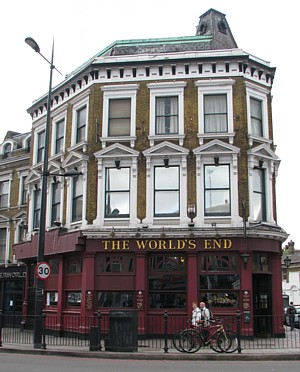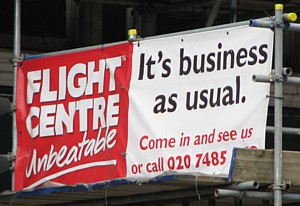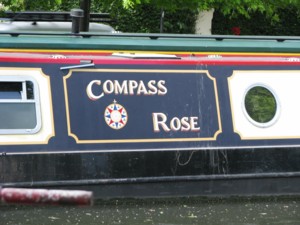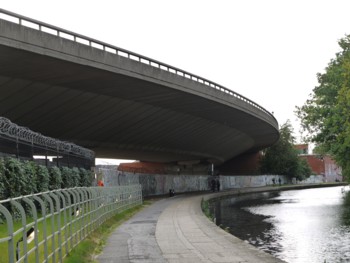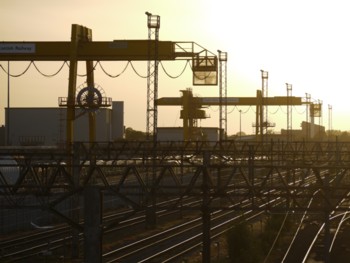We are developing the social individualist meta-context for the future. From the very serious to the extremely frivolous... lets see what is on the mind of the Samizdata people.
Samizdata, derived from Samizdat /n. - a system of clandestine publication of banned literature in the USSR [Russ.,= self-publishing house]
|
Ultracapacitors are my bet for the way to replace gasoline fueled vehicles. Hydrogen is just not dense enough even in hydrides and there is no infrastructure for it. Batteries are too heavy, too short lived, have complex temperature and charging requirements to maximize life, take too long to charge and are not improving quickly enough. Synfuels are possible but require a lot of new plants and the fuel is going to be expensive.
Electricity, on the other hand, is available everywhere. Once you have the ability to connect a plug and ‘fuel’ your vehicle at least as quickly as you currently do and have a range equal or greater than you now have with gasoline or diesel, there is simply no contest.
The electric car, with a motor on each wheel, gives neck-snapping acceleration, handling and braking that are awesome and all in a much simpler package. No differential, no coolant system, no transmission, no high temperature combustion, no crankshaft, piston rings or rockers, no oiling system… in the ultimate electric car there is little more than batteries, power distribution, four motors and a bunch of computers to control them. As much as I loved my old MGB, the internal combustion engine is unlikely to outlast the middle of the century. It simply will not be able to compete.
A Tesla in every garage… I can deal with that.
Here is one of those quotes where you add “read the whole thing”:
But next time you are told that Osborne is imposing savage, reckless cuts on the UK, remember that the figures tell a different story. So far, spending is still going up. The plan is for total spending to go up in cash terms overall this financial year and to fall by 0.6 per cent in real terms (the measure that really matters). This will hurt, especially given that debt interest payments are soaring, reducing the funds available for public services by a lot more than the 0.6 per cent overall cut. But this should also be put into context. Barack Obama, who was in London yesterday, wants to cut public spending by 3.8 per cent next year, more than the 3.7 per cent pencilled in over four years by Osborne. In other words, Obama’s cuts – which many in the US want to make even larger – are four times larger than the average annual cuts proposed by slowcoach Osborne.
So it is no wonder really that the UK’s credit rating was downgraded yesterday by (wait for it) Chinese rating agency Dagong, which cut the UK by one notch to A+, from AA-, and placed it on a negative outlook. You may snigger – but unless the UK is able to deliver on its fiscal austerity not just this year but for the next four, our creditors will soon start panicking again, with good reason.
That’s Allister Heath, writing in the London giveaway newspaper, City A.M., which he edits. His point being that the journey in question has only just begun.
Read the whole thing. The above quote comes at the end. Before that come a few of the facts and the figures.
I suppose the optimistic take on all this is that you can’t wrench a graph that is going up onto a downward path, just like that. But how much wrenching is actually going on?
…have been rather unwell lately, hence it has taken rather longer than usual to get comments approved if they have aggro’ed smitebot. Do not be concerned if you have no idea what this means 
“You heard it here first – we were not born in the Garden of Eden.”
– Tara Smith, talking at the Adam Smith Institute last week, with reference to the idea that we get to inherit something called Original Sin.
Here is an interesting take on the two mainly libertarian-leaning candidates for the Republican presidential ticket: Gary Johnson and Ron Paul. Our own Brian Micklethwait has thoughts on Johnson (he’s a fan); I certainly would be more inclined, if I were a US voter, to go for GJ rather than Ron Paul. Mr Paul is sound on issues like the Federal Reserve but on a lot of stuff, his classical liberal credentials strike me as a bit suspect, although people whom I respect, like Brian Doherty of Reason magazine, say nice things about him.
Of course, the fact that such persons can have a crack at a presidential nomination is in itself a fact that separates the US from the UK. I cannot at the moment think of a single major UK Conservative politician who comes close. And as for continental Europe…….oh dear…..Silvio Berlusconi? (That was a joke).
Indeed:
It’s a pub, across the road from Camden Town tube station. But, unlike the people Perry had a chuckle about yesterday, their End is, I presume, a place rather than a time. End as in: here your journey stops, rather than now everything stops.
Looking the other way from the tube exit, I wondered if these guys were trying to tell us all something similar, about the likelihood that the world will not be ending any time soon:
I was in Camden to meet a Goddaughter, and the two of us then walked west along the Regents Canal. Recently, I watched a TV show about the revival of Britain’s canals as desirable places to have fun on and to live next to, following their eclipse as the dominant mode of transport by the railways and their descent to wet slum status and dereliction. We saw plenty of evidence of this revival. In particular, we saw many, many canal boats, most at rest, many in motion.
The river boat we saw that the readers of this blog will probably approve of most strongly was the one called this:
Although, the boat name that I found the most intriguing was this:
Compass Rose was the ship that got sunk in Nicholas Monsarrat’s novel about the war in the Atlantic, The Cruel Sea, which was then made into a very popular movie of the same name, starring Jack Hawkins. I don’t believe that to be a coincidence.
We saw many other sights. I liked the floating restaurant, that was doing brisk business. I was intrigued that for long stretches of the canal, roads and railways near to it are at a significantly lower level, often spectacularly so (as at the point where the canal is crossed by two big elevated roads, one on top of the other, in the Paddington area) and quite a few houses and business buildings next to the canal had basements below canal level.
Later in the afternoon, I liked how a curve in the elevated M40 juts out over a curve the opposite way in the canal, but without them crossing, like this:
And we both enjoyed photo-ing the birds in the big bird cage designed by Princess Margaret’s ex, which is right next to the canal. I did not know this.
By the time the sun was setting, we had reached Willesden, where I had further fun photoing the sunset through incomprehensible railway clutter. Click on the picture below if you’d like to see it bigger:
At which point we were both pretty tired, so we sat down in a Chinese and ate, and then went home. And I’m pretty tired now, so I will leave it at that.
Our own Dale Amon has just been named Space Activist of the Year by the National Space Society. Well done Dale.
There have been three Chinooks with US markings circling overhead above my house in London for quite some time now, and for a moment I thought that maybe the rapture was at hand and they were here to air lift me off to heaven… or wherever else it is that rotorheads go when they kick off for the last time.
Actually a place with large helicopters perpetually circling overhead fits my preconception of ‘heaven’ rather well, so maybe the world *did* end as I was certainly watching them in complete rapture.
Result!
Hello? Is there anyone else out there?
The main problem with having discussions about economics and financial markets is this: People look at these complex phenomena through entirely different prisms; they use vastly dissimilar – even contrasting – narratives as to what has happened, what is going on now, and what is therefore likely to happen in the future. Citing any so-called “facts” – statistical data, or the actions and statements of policymakers – in support of a specific interpretation and forecast is often a futile exercise: The same data point will be interpreted very differently if some other intellectual framework is being applied to it.
– The opening paragraph of Detlev Schlichter’s latest commentary on the state of the world, entitled Beyond Repair – This will not have a happy ending.
So, Ken Clarke hamfistedly but correctly says there are degrees of seriousness in rape and the law reflects this – and causes great outrage. Not just from the avowedly feminist Guardian either. The Sun says he’s a danger to women, no less.
Interestingly, both the the Guardian’s and the Sun’s commenters seem to take a more nuanced view than their respective papers. As they should. Clarke was attempting to make a valid distinction. Sure, he messed it up, particularly when he appeared to confuse date rape and statutory rape, but of course there are degrees of seriousness in rape as in any other crime. To say that is not to say that any form of rape is trivial. Whoopi Goldberg’s much derided comment that Roman Polanksi was not guilty of “rape rape” was not outrageous because she attempted to distinguish between statutory and actual rape, but because Polanski had committed rape rape.
It distresses me that so many of those who seek to help to rape victims seem to act all the time as if they were a politician on the radio. By this I mean that they have always ready in their heads one idea, one sound bite, that they must express. Nothing must detract from that message; no ifs, no buts, no side issues. I agree entirely with the One Idea in this case: all rape is serious. But when one sees what trouble a real politician on the radio got into for merely touching upon the reasons for a sliding scale of sentences one also sees why most politicians try so hard to stick with the pre-prepared One Idea. Meanwhile Lara Williams in the Guardian (linked to above), a woman whose real-life experience of helping rape victims would lead one to hope that her views were rooted in observation, comes out with the sort of mindlessly simplified slogans that have given politicians a bad name:
Through distinguishing “serious” and “less serious” rape, Clarke assumed a perverse gradient of suffering, a warped taxonomy of perceived victimisation.
No one actually believes that. If called upon in court to state what impact a particular rape had had on a particular victim, I have no doubt that this writer would recoil in horror from saying, “Oh, the usual. All rapes have the same impact. All rapes are equally bad.” Yet that is the logical implication of what she has written. She is not the only such commenter. It is sad to see obviously intelligent and compassionate people with so little faith in the public that they make themselves believe that the only way to put forward a true idea – all rape is bad – is to coarsen it into falsehood.
“A cleaner (janitor) at a London gallery cleared away an installation by artist Damien Hirst having mistaken it for rubbish. Emanual Asare came across a pile of beer bottles, coffee cups and overflowing ashtrays and cleared them away at the Eyestorm gallery on Wednesday morning.”
I still treasure that story, which appeared in this item about the art world (thanks to Tim Sandefur for the pointer. He is on a bit of a roll at the moment).
In thinking of art and tracing out the trends, good and possibly not so good, you can do a lot worse than read this book by Ernst Gombrich.
We seem to be having quite a lot of referendums at the moment in the UK and Europe. As we might note with a sort of grim amusement, the largest recent ones – on the EU Constitution – were airily ignored with customary insouciance by the EU political elites, and therefore fill many people will understandable cynicism. Over at the EU Referendum blog there is a long item about protest movements, violence, referendums and political change. I may have more to say when I have the time to study it. It looks a good piece, and I recommend it.
Talking of protests, here is a nice collection of photos of recent “rally against debt” held in central London a few days ago, as taken by our own Brian Micklethwait.
|
Who Are We? The Samizdata people are a bunch of sinister and heavily armed globalist illuminati who seek to infect the entire world with the values of personal liberty and several property. Amongst our many crimes is a sense of humour and the intermittent use of British spelling.
We are also a varied group made up of social individualists, classical liberals, whigs, libertarians, extropians, futurists, ‘Porcupines’, Karl Popper fetishists, recovering neo-conservatives, crazed Ayn Rand worshipers, over-caffeinated Virginia Postrel devotees, witty Frédéric Bastiat wannabes, cypherpunks, minarchists, kritarchists and wild-eyed anarcho-capitalists from Britain, North America, Australia and Europe.
|

